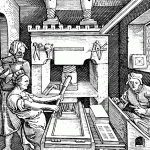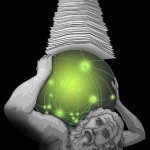Technology And Evolution
Apr 06
- Technology, the ever changing marvel we know today, slowly evolved over many thousands of years beginning with the most humblest of mankind’s attempts to make our lives less burdensome, more secure and somewhat meaningful.
- The first small groups and tribes utilized primitive hunting and gathering techniques
- Human life was very brief and unimaginably uncomfortable compared to any contemporary standards
- They were almost totally dependent on the environmental forces that controlled and dictated everyday survival
Tech-nol-o-gy: 1. The application of science, esp. in industry or commerce. 2. The methods and materials thus used.
The American Heritage Dictionary
The Evolution of Information

- Agriculture slowly evolved out of the wandering lifestyles of our early ancestors
- Language and writing skills were developed in the Agricultural Era
- Information was finally recorded, at first in slower more cumbersomeways, and later through the Printing Press
The Industrial Age Awakens

- Education accelerated the pace of information and the rise of universities, which became intellectual sanctuaries
- By the 19th century powered printing presses quickly disseminated research and development
- And by the 20th century education and information were the engines of societies dominated by machine technology
The Great Leap to Digital Access
 The Industrial Age is now in transition to an even more advanced level of technology. The Digital Revolution has in a very short period of time changed our civilization forever. It is the era of access. Information is so accessible through the use of computers, that it has in essence increased the potential scope of democracy.
The Industrial Age is now in transition to an even more advanced level of technology. The Digital Revolution has in a very short period of time changed our civilization forever. It is the era of access. Information is so accessible through the use of computers, that it has in essence increased the potential scope of democracy.
Electronic impulses translate information into units of energy which can then be collected and stored digitally and used by everyone.
The computer does not discriminate. It only follows commands, delivering information to the operator, rich or poor, male or female. Information has lost much of its privileged status, it is universal, and its limitations are mainly what the operator brings to the computer.
Information is the Product
- Information has always been an integral part of mankind’s evolutionary progress through time
- Every new step in our political, economic and social evolution has been based on compiling information
- But now information has reached the point where it is not only the means to develop and manufacture products, but the ability to access and store information is the major product and service provided
Freedom or Failure
Some futurists are predicting the emerging electronic era to be the beginning of the final step in man’s technological evolution. The tools of the future will continue to be more complex computers, and when computers are universally adopted by all countries and individuals the world states will reach a state of relative parity. Information will be immediately available to everyone for problem solving, research and daily activities. Many futurists even predict that with universal access to information, everyone will be substantially equal, freed by technology from traditional economic, political, and social restrictions.
 For many others though, it is not so clear how steadily increasing populations, still struggling to adapt to the cumulative changes of the past two thousand years, will be any more successful. Especially, when we are constantly bombarded by the unrelenting pace of future technology and unending information.
For many others though, it is not so clear how steadily increasing populations, still struggling to adapt to the cumulative changes of the past two thousand years, will be any more successful. Especially, when we are constantly bombarded by the unrelenting pace of future technology and unending information.
- Certainly there are those who have and will continue to readily adapt to any digital scenario
- But there will be many others who will struggle with new hi-tech lifestyles, dominated by impersonal and uncaring computers
- There is an ever widening gap between the well paid, highly skilled, computer literate elite, and the technically unskilled, who are therefore relegated to lower paying jobs, restricted mobility and an uncertain future

